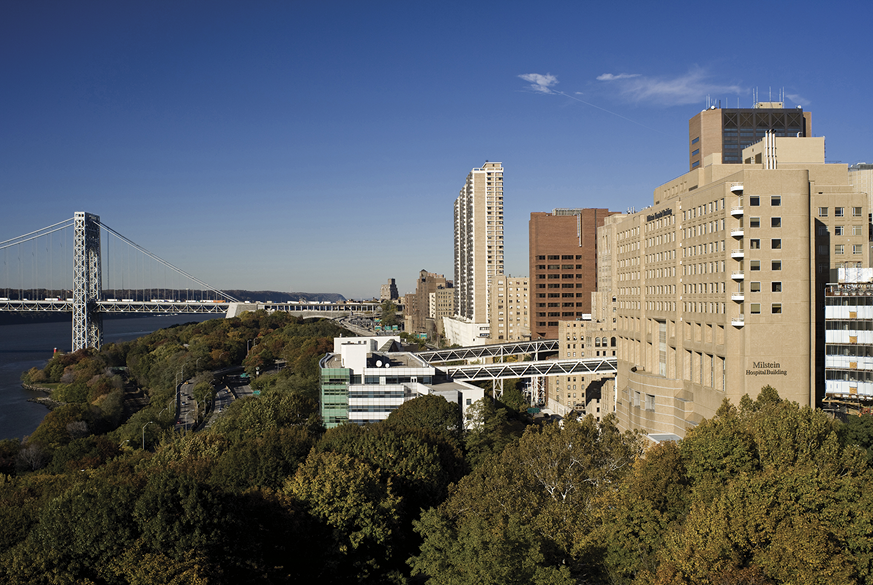- Home
- Media Kit
- MediaJet
- Current Issue
- Past Issues
- Ad Specs-Submission
- Ad Print Settings
- Reprints (PDF)
- Photo Specifications (PDF)
- Contact Us
![]()
ONLINE
![]()
ONLINE

Patient Care
Editors’ Note
Dr. Steven Corwin has served as CEO since 2011 and President & CEO since 2015. Dr. Corwin joined the management team of NewYork-Presbyterian/Columbia University Irving Medical Center in 1986 and served in various management capacities. From 2005 to 2011, he was Executive Vice President and Chief Operating Officer. A cardiologist and internist, he received his undergraduate and medical degrees from Northwestern University, graduating summa cum laude and with Alpha Omega Alpha honors. He completed training in internal medicine and cardiology at what is now NewYork-Presbyterian/Columbia University Irving Medical Center and in 1986 was named to the faculty at what is now Columbia University Vagelos College of Physicians and Surgeons.
Institution Brief
Located in New York City, NewYork-Presbyterian (NYP.org) is affiliated with two of the nation’s leading medical colleges, Weill Cornell Medicine and Columbia University Vagelos College of Physicians and Surgeons. NewYork-Presbyterian provides state-of-the-art inpatient, ambulatory, and preventive care in all areas of medicine, and is committed to excellence in patient care, education, research, and community service at ten hospital campuses: NewYork-Presbyterian/Weill Cornell Medical Center, NewYork-Presbyterian/Columbia University Irving Medical Center, NewYork-Presbyterian Morgan Stanley Children’s Hospital, NewYork-Presbyterian Allen Hospital, NewYork-Presbyterian Westchester Behavioral Health Center, NewYork-Presbyterian Lower Manhattan Hospital, NewYork-Presbyterian Westchester in Bronxville, NewYork-Presbyterian Brooklyn Methodist Hospital, NewYork-Presbyterian Hudson Valley Hospital, and NewYork-Presbyterian Queens.

NewYork-Presbyterian/Weill Cornell Medical Center
NewYork-Presbyterian is a purpose-driven organization with a long history of supporting its employees, patients, and communities. How do you define NewYork-Presbyterian’s purpose and how is purpose at the foundation of NewYork-Presbyterian’s culture?
NewYork-Presbyterian is one of the nation’s most comprehensive, integrated academic healthcare delivery systems. We are dedicated to providing the highest quality, most compassionate care and service to patients in the New York metropolitan area, nationally, and throughout the globe. We are committed to caring for every single patient who walks through our doors. Everyone needs healthcare and the lights of our hospitals are always on. We are deeply connected to local communities and have a long-standing commitment to understanding and serving their needs from the everyday to the extraordinary.
Our purpose is engrained in nurturing and growing our workforce to be the home of world-class medical experts, investing in vital research and cutting-edge clinical innovation, and prioritizing heath justice for all.
What do you see as the biggest challenges facing leading health systems and hospitals as you look to the future?
Looking to the future, I see four challenges – the first is meeting patients where they are to provide high-quality care. There will always be a need for in-person hospital visits, and nothing can replace a high-touch, human experience, but we must be able to meet our patients in their communities and in their homes.
Next is recruiting and retaining talent which is vital to maintaining operations. Pre-pandemic, the healthcare industry was impacted by staffing shortages, and we are still seeing waves of change due to burnout. We must take care of our staff and keep a strong pipeline of new talent.
Making concerted efforts towards prioritizing health equity is also an imperative. Black people in the United States had a death rate from COVID-19 that was double that of the white population, which is alarming. Underserved communities need more and better access to care.
Finally, digital transformation is an imperative to advancing medicine today. Whether it’s telemedicine, artificial intelligence, or better use of big data and insights to improve prevention and delivery of care, the future is digital in order to be able to enhance the patient and physician experience.

NewYork-Presbyterian/Columbia University Irving Medical Center
What is your vision for the evolving role of the hospital as health systems grow their ambulatory care and outpatient facilities?
How and where we deliver care to our patients to make sure we can meet them where they live and work – no matter what they need – has been an important priority for our health system, long before the pandemic. And the role of the hospital has never been more important as it drives a system of care that continues to evolve with many options.
The pandemic, however, brought a surge in telehealth use and a drop in emergency room visits which has accelerated the need to expand our ambulatory practice reach and outpatient services overall. Today, NewYork-Presbyterian’s ambulatory practice footprint consists of over 190 primary and specialty care sites across the five boroughs, Westchester, and the Hudson Valley including seven school-based health centers.
Regardless of this shift, the hospital and inpatient services will maintain a central role in the health system. Hospitals such as academic medical centers, like ours, that have a strong focus on highly complex cases that require greater levels of specialty care, will continue to sustain a demand for inpatient services.
There is a great deal of discussion about New York’s future. In leading an institution like NewYork-Presbyterian with such a long and storied history in New York, are you optimistic that New York will recover and rebuild to remain a leading global city?
I have no doubt that New York will remain a leading global city and do what it takes to maintain that recognition. This isn’t the first time that New York City has proved its resilience in the face of disaster. As a city, we will never forget the impact of 9/11, but the city built back stronger than ever, and we will again.
What do you see as the keys to New York City’s recovery and how critical is it for there to be a strong public/private partnership working together to secure New York’s future?
In New York City specifically, we have a long history of public/private partnerships that leverage the power and reach of government with private funding that can be made available more rapidly in times of crisis. As we address the aftermath of this global pandemic, public/private partnerships will be even more essential as our city, and country, strive to recover. Public resources alone won’t be enough, and these partnerships will be needed to cover gaps, support innovation, test new ideas, and implement important programs.
As a country, we also need to ensure that there are enough resources to rebuild and modernize our public health infrastructure so that we can keep ourselves and our communities safe and prepared for any future events of this magnitude.
NewYork-Presbyterian is deeply engaged in the communities it serves. Will you discuss NewYork-Presbyterian’s commitment to community and population health?
Quality of patient care is central to every decision we make. Not only do patients expect personalized care, but they also expect care that is convenient and easily accessible. We are making care more accessible through a hybrid of in-person and virtual healthcare solutions, digital clinician communication tools, patient education, and community outreach. We are also increasing access to services like remote patient monitoring as part of our continued efforts to improve patient outcomes, lower hospitalizations, and reduce patient expenses. With 10 campuses across New York City’s five boroughs, Westchester, and the Hudson Valley, combined with a telehealth program that was implemented long before COVID-19 impacted the state, we’ve made a conscious and concerted effort to make sure people know they have plenty of options to access care when, where, and how they need it through a seamless system that prioritizes patients first. We are also acutely aware that virtual solutions may not be equally accessible to all our patients and are continually working to ensure equitable access to care for all.
NewYork-Presbyterian partners with community-based hospital and academic organizations to impact the health and well-being of children, adolescents, and adults through innovative population health initiatives, care provider training experiences, scholarships, and research. These initiatives are collaboratively developed, implemented, evaluated, and sustained. It is only by combining the skills and resources of NewYork-Presbyterian with the energy, immense talents, and resources of our community partners that these goals can be achieved. Our partnerships with community-based organizations and health and human services agencies support initiatives that empower individuals and families to promote health and wellness, better navigate local systems of care and local resources, improve school readiness and academic achievement, and ultimately improve quality of life.
The unifying theme of NewYork-Presbyterian’s community and population health initiatives is that we are focused on an evidence-based approach to overcome disparities over the life span. Together with like-minded community-based organizations, we are striving to improve the overall health of the communities we serve, and together we are making a positive difference.
How critical is it for medical schools to transform their curriculum to best prepare the future leaders in medicine?
The science and technology of medicine is constantly evolving, which means that what we’re teaching to our medical students and residents must also follow suit. In my opinion, one of the most important aspects of the curriculum that must continue to transform is the emphasis on health equity and health disparities. We need to educate on the impact of social and structural determinants of health, the challenges that our patients face because of their race, ethnicity, and location, and what solutions exist, or are needed, to achieve better access to high-quality care and outcomes. By equipping our medical students with more training about the unique health needs of underserved populations and areas, these future physicians will be better able to address them.
What advice do you offer young people interested in building a career in medicine?
As we continue to get used to a “new normal” two years into the global pandemic, I could not be more proud of every one of my employees who has made the decision to work for a healthcare institution. Each and every one of them, no matter the role, has an impact on the difference we make in our patients’ lives.
Specific to a career in medicine, regardless of the incredibly difficult challenges that come our way, it is a career that is extremely rewarding and humbling. Medical professionals are constantly curious, committed to their craft, and always looking for novel solutions to reducing morbidity and mortality rates, and improving the patient experience. At NewYork-Presbyterian, we’re fortunate to have some of the brightest minds in our field building their careers with us and I look forward to seeing how they contribute to the evolution of medicine into the 21st century.![]()